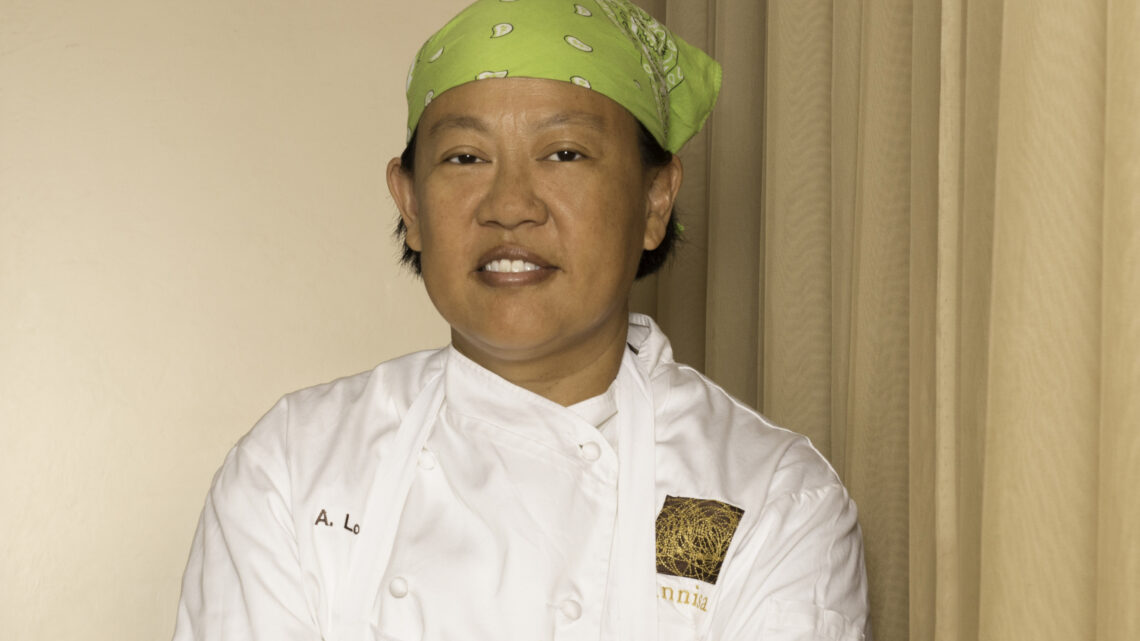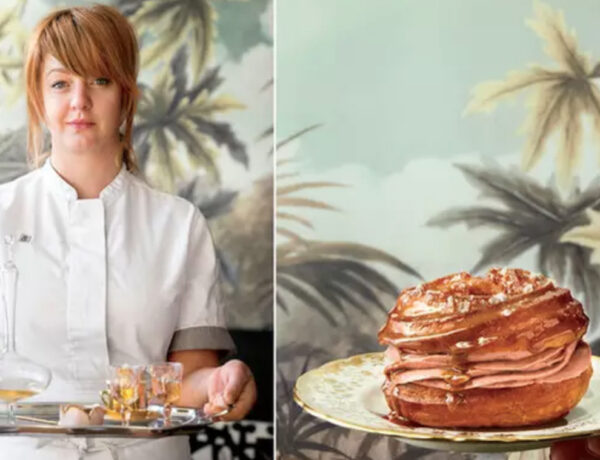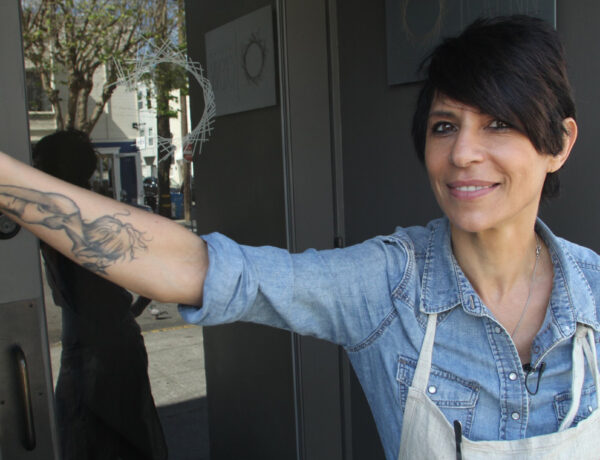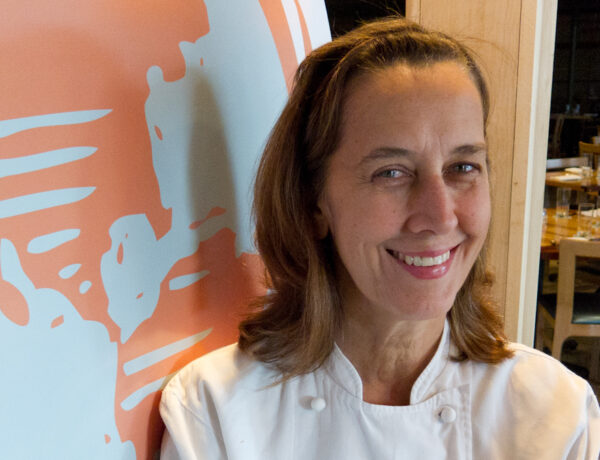Michelin-starred chef, Iron Chef winner, Top Chef Master, advocate for equality and diversity, first female guest chef to cook for a state dinner at the White House … these are just a few of the incredible accolades that describe Chef Anita Lo’s inspirational career. She shares her candid perspective on today’s gender equality issues and why she says we need an “old girls club” now.
What would you say is today’s key issue for women in foodservice?
I think we have a culture war going on. We’ve got all sorts of hurdles to overcome in our overall culture just as women in general, but also within the culture of the restaurant business itself. We need everyone to take a hard look at what you expect from the male/female dichotomy – what it means to be male and what it means to be female, how we raise our kids, what the images in our general surroundings and the media say about us and how that keeps women in boxes.
Have you seen that the issues with gender roles have evolved over the course of your career?
I think at the heart of everything it’s still the same. Right now, we have a chance to actually change things because people are listening. I think we have to look at it holistically and there isn’t really one solution. It’s a really broad issue … it’s intersectional.
Are there any specific examples that you can share of different gender or racial bias that you met with at certain points in your career and how you overcame those?
Well, you know, it’s amazing how many people come into your restaurant like, “I’d like to meet the chef. Is he here?”
My mom was a doctor and it used to happen to my mom all the time. She was the only female doctor, the only female doctor of color, in her entire hospital.
I definitely feel like I’ve been pigeon-holed. I did do a good amount of Asian cuisine back in the day, but Annisa has always been Contemporary American, and for some reason I just can’t get out of that box. I’m French-trained and I speak French, I don’t speak Chinese. Despite all of this I’m still getting people calling me up about Chinese New Year and stuff like that which we didn’t even celebrate.
What advice would you give to women who are struggling with being labeled, and not wanting to be identified as a female chef or in context of their race?
You know I haven’t figured that out. I’ve just been fighting that my entire life. I think you really just have to speak up as much as you possibly can. It gets tiring and it’s hard … I’m certainly not perfect at it, but you need to try to catch people in the moment and teach them. We need to be talking with our spouses and friends, so we’re not raising kids in binary gender roles. That is really limiting for women, and men too, especially emotionally. We need to really watch that.
What advice would you give to women in the industry who are currently facing gender bias within their daily career and who might not feel like they have, or know about, outlets and options to help?
Well, your outlet [Reset the Table] is great. It really is important to find your support group.
There’s always been an old boys club. We need the old girls club now. And that will help you speak up. I think you need to learn to speak up in the moment, to stay strong and be unwavering, and to demand what is rightfully yours. I mean, all we’re asking for is equality. We’re not asking for more than that.
What advice would you give to men either in a manager role, or as a peer, in how they can help support women in foodservice.
Yeah, you need to be aware. I think you need to ask yourself some hard questions about whether you’re treating men and women differently, and if other people below you are treating men and women differently, and then correct that. That takes some introspection. This may not necessarily come naturally, but this is a good time to change.
What has been the biggest accomplishment of your career thus far, and is there anything that you’re hoping to still achieve?
After the fire we had to close [Annisa] for nine months. On many occasions we thought we weren’t going to reopen. We didn’t quite have enough money and the insurance took forever to come through. I had to re-negotiate my lease, because I was at the end of a 10-year lease. It was really hard, and nine months is a really long time. But when we were finally able to re-open, every single one of my staff came back except for one that had taken a manager position in the meantime.
What do I still want to do? I’m in this transitional period right now, but I’m hoping, like “the boys”, to have a long-term consultancy somewhere. I would like to be able to oversee a restaurant, preferably in another city or country where I would like to visit, and have my name on it, set it up and make sure it’s working properly, but then just check in without having to be back-of-house every day. That is one of the things that I’m hoping to do. I think a lot of guys seem to get those deals.
What about this crazy industry personally keeps you motivated and driven through it all?
I love teaching, and I love to see the people that work underneath me grow to become their own chef.
I think being a chef and having a restaurant, one of the things that you get to do, besides make good food, is to create community. And I think that has to be one of the more important things that you do as a chef. The people that have worked underneath me are now spreading out, have their own places and are creating their own communities. And that’s pretty powerful.
You were the first female guest chef to cook for a state dinner in the White House. Can you describe a little bit about what that opportunity meant to you?
I remember when Marcus Samuelsson did that, and I was like, “Oh my God, I really want to do that!” I’m all about diversity, culture and know what it means to be an American.
And so, a couple of years went by and I got an email from the White House and I was completely elated. It was amazing. But it was hard. We did 250 covers, in 35 minutes, 4 courses.
At Annisa your wine list showcased female vintners.
It was basically a celebration of women in wine, it was mostly female vintners. Before that I don’t think there were any other lists that did that. But after I closed Annisa, Amanda Cohen picked up the reigns and now has a wine list that features women in wine, which is great.
Have there been other conscious decisions like that, where you’ve used your position of power to help shine a spotlight on women?
I really made sure that our service wasn’t gendered. Back in the day, a lot of times people would serve the woman first, pull out the woman’s chair, or only give the wine list to the man.
And we just made sure we didn’t do that. I think all of that really just sends the message to women that we’re dainty … we can’t make decisions … we can’t pull out our own chair. It’s demeaning.
Are there any peers that you particularly admire for having created positive change for women?
I think Amanda [Cohen] has done some great things. You know that article that she wrote for Esquire was so right on, so well-written and funny. I think there’s a lot of women out there who are working towards this.
Is there one thing that you really feel needs to change in our industry? How do you think that will happen?
Yes, some of this hazing that goes on, the sexual harassment. The fact that we’re shining a light on it and trying to change some of the laws at the moment makes me hopeful that it will change.
What I also really want to see happen is to have equality between the front and back of the house. I think that’s a lot harder in really expensive, fine dining. The difference between what the front of the house makes and what the back of the House makes, in a relatively expensive restaurant, is huge. So, the new minimum wage is helping some of this. If they get rid of the tip credit that’s going to make it even worse, because basically a restaurant only makes so much money.
Sometimes when we had private parties it was four, sometimes five times difference between what the front of the house was making over the back of the house, and that’s just wrong. It’s incredibly important what the front of the house does, but it’s not 4 to 5 times more important than what the back of the house does.
Is there one piece of advice that you’ve received over the years that has just always stayed with you?
Never to open a restaurant.
And I didn’t listen.
And I’ve told my other cooks never to open a restaurant, and they didn’t listen either. But what that means to me is just that they have the passion to go ahead, and that’s what it takes to actually make it worthwhile. You have to have amazing drive.





